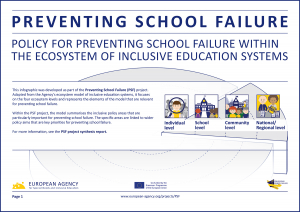This area contains multimedia materials including key messages, presentations and links to videos from the EASNIE YouTube channel.
Roles and responsibilities of inclusive school leaders within the ecosystem of inclusive education systems

This six-page infographic was developed as part of the Supporting Inclusive School Leadership (SISL) project. Adapted from the Agency’s ecosystem model of inclusive education systems, it focuses on the four ecosystem levels and represents the elements of the model that are relevant for school leadership.
For more information, see the SISL project synthesis report.
Download this infographic below and share it using the Agency’s hashtag: #EASNIE
Policy for preventing school failure within the ecosystem of inclusive education systems

This six-page infographic was developed as part of the Preventing School Failure (PSF) project. Adapted from the Agency’s ecosystem model of inclusive education systems, it focuses on the four ecosystem levels and represents the elements of the model that are relevant for preventing school failure.
For more information, see the PSF project synthesis report.
Download this infographic below and share it using the Agency’s hashtag: #EASNIE
Inclusive Education in an International Perspective
Key messages from Agency Director, Cor J. W. Meijer's presentation entitled 'Inclusive Education in an International Perspective' at Eötvös Lorand University in Budapest, Hungary.
